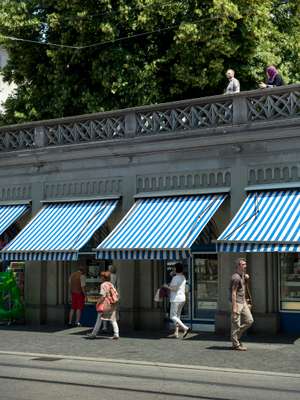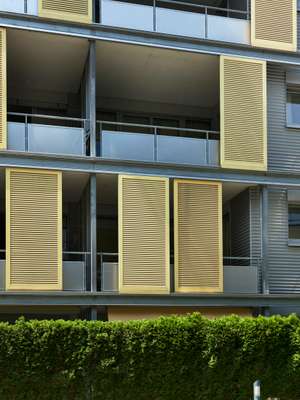Business / Global
Roll up, roll up!
The planet is getting warmer and urban residents as far north as Sweden are feeling the effects. Don’t sweat it: rather than reaching for the air-conditioning, try throwing some shade.
How do you keep cool? Depending on where you live, this might not be a priority. But as hotter weather becomes the norm across the world, it’s not a question that can be avoided for long. In 2019 the UK experienced its warmest February on record – temperatures reached a balmy 21c – and the previous summer broke records across Europe. Globally, nine out of the 10 warmest years on record have come since 2005.
In many offices, hotels, shops and homes, this kind of weather means one thing: cranking up the air-conditioning. But there is another option for those keen to stay sweat-free without relying on installing unsightly machines: window shades. “We’ve noticed that growth rates for these are going through the roof in Europe: about 7 to 10 per cent annually,” says Alexander Grundhoff, managing director of Germany’s Warema International. With 5,000 employees and a turnover of €510m in 2018, the company is one of the largest suppliers of external shades in Europe, selling everything from pergolas to roller shutters. Its sales are concentrated in colder countries so its bestselling products have long been geared towards providing insulation and privacy. But over the past 20 years, says Grundhoff, it has seen a marked increase in sales of products for sun protection, particularly exterior Venetian blinds and fabric awnings. “Those products have been grabbing a relatively large slice of the residential market share,” he says.
Cooling buildings by preventing sunlight from entering is hardly a new idea. Mediterranean countries have long made use of deep balconies and awnings; southern US homes boast shady porches and verandas; and traditional north African and Middle Eastern buildings feature perforated walls that act as screens. Now the hot weather common in such places is spreading. The planet has warmed by about 1c since 1900, scientists say; and that could rise to 1.5c or even 2c by the end of this century. Heatwaves will become more frequent and last longer. As a result, people in places as far north as Sweden are having to think about ways to cool buildings without changing their architectural vernacular.
Air-conditioning seems like an obvious solution but, as well as looking awful and being noisy, it actually makes the problem worse. In the US, it is used by 90 per cent of homes, accounting for 6 per cent of the country’s residential energy use and spewing out 100 million tonnes of carbon dioxide a year. Shades require no energy, have a low carbon footprint and can be used for decades. They also look sharp and provide privacy and security.




Increased interest in such products has been felt along the entire supply chain. “Integrated shading solutions are very Swiss but we now see an increasing demand for it in other countries,” says Angelo Razzino, head of sales at Sky Frame, a firm based near Zürich that specialises in large high-end frameless sliding doors and windows. “We work with [Swiss shutter firm] Griesser and [customers] get everything from us.”
The future looks similarly bright for France’s Dickson Constant, a worldwide leader in manufacturing technical textiles. “Our customers are more and more aware that they need to find sustainable solutions to higher global temperatures,” says Adrien Derreumaux, who manages the brand’s solar-fabrics portfolio. “Shade and sun protection is our number-one market, especially in Europe. In total it accounts for about 50 per cent of our business. Within this, our biggest market is for retractable awnings.”
Dickson Constant’s direct clients are other businesses, such as Warema. Home owners make up two thirds of final customers, with hospitality and retail companies accounting for the rest. The historic Peninsula Hotel in Paris, for instance, was reopened in 2014 after extensive renovations and now features neat green awnings using material from Dickson’s Orchestra range. “We still see a lot of potential for further growth, partly because of global warming but also because of the rising costs of energy,” says Derreumaux. “Shade and sun protection products are a sustainable way of controlling a building’s temperature. There is a greater awareness of the need for that, not just from our end customers but also from the building industry and architects.”
Danish engineering and design giant Ramboll has seen a lot of interest in alternative cooling methods for cities and individuals. It has studied ways to reduce urban heat through its annual Copenhagen Urban Lab, which has run for three years. “In Singapore, for example, they are focusing on greening neighbourhoods and buildings to provide natural cooling,” says Christian Nyerup Nielsen, Ramboll’s senior director for climate adaptation and landscape. “That includes green façades, roof terraces and green streets. In New York they’re going back to older techniques from southern Europe, with more focus on natural ventilation and all kinds of shading.”
When Ramboll works on large-scale projects where air-conditioning is required, it focuses on hybrid schemes. “We design the airflow inside the building and optimise the controls,” says Nielsen. “When do you flush air and when do you shade the building? So you can have natural ventilation and then also use ground- or seawater [a sustainable source that is already cooled] for air-conditioning.”
Investing in temperature control is about more than fixing a stuffy office. “There are serious health issues at stake,” says Nielsen. “There’s also the efficiency of the workforce and the effect on infrastructure; the financial impact of heat on a city can be measured in millions of dollars.”
As we move into a new, warmer decade, consumers and architects would do well to take advantage of the growing range of options available. Just don’t say that you were kept in the dark.
Keeping cool – a manifesto:
1. Add loggia balconies that catch the sun less.
2. Design homes that maximise cross-ventilation.
3. Use awnings or shutters on any sun-facing window.
4. Use greenery as much as possible – in the street and on buildings.
5. Ditch the air-conditioning.


